Vineyard Wind project making progress in Barnstable
On a recent morning in Charlestown, state Rep. Jeffrey Roy stood, amazed, as he watched a giant wind turbine paddle put through the paces at the Wind Technology Testing Center.
"They were testing the blades that are going to be used in the Vineyard Wind project," he said, in a telephone interview afterwards. "They're 170 meters. They're really huge."
To put that into perspective, 170 meters is equivalent to nearly 558 feet — longer than the standard 360-foot NFL football field.
"They're bending them, moving them, and pulling them, looking for any signs of fatigue," said Roy, a Democrat from Franklin.
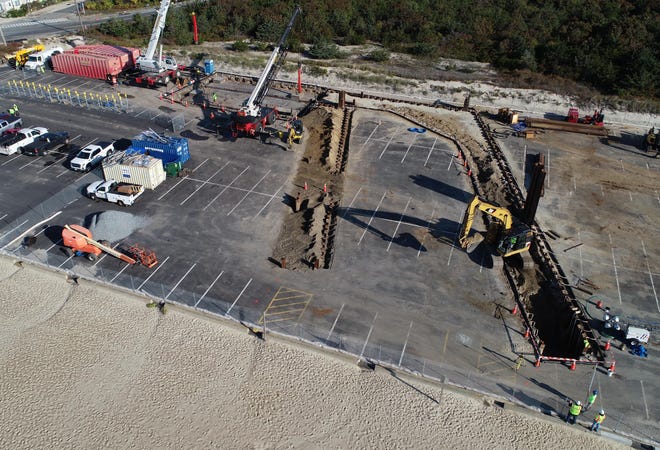
As House chairman of the Joint Committee on Telecommunications, Utilities and Energy, Roy has been at the front of Massachusetts' pioneering off-shore wind wagon train. He has long been an advocate for sustainable, clean energy, and is excited to see Massachusetts taking the lead with Vineyard Wind, the nation's first commercial-scale, off-shore wind project.
"This is a huge moment for Massachusetts in the development of the wind industry," said Roy.
The official groundbreaking on the project was at Barnstable's Covell's Beach on Nov. 18 last year — an occasion Roy said was a "huge moment" in state history.
He and the rest of his committee are regularly briefed on the project's progress, which Roy said has been moving along well, with parts moving at the Charlestown testing facility; in New Bedford, where the turbines will be constructed, and in Barnstable, where Vineyard Wind will land its two submarine transmission cables.
Andrew Doba, director of communications for Vineyard Wind, said everyone working on the project shares the same sense of excitement as state and local leaders.
"It's not often you get a front-row seat for the launch of a brand new industry," he said.
Over last winter, conduits were tunneled several feet under the beach to receive the cables that will eventually transport energy generated at the wind farm 35 miles out to sea — the company's lease site is about 15 miles south of Martha's Vineyard, in shallow waters just west of the Nantucket Shoals.
As of now, Doba reported, "we have completed the horizontal directional drilling under the beach."
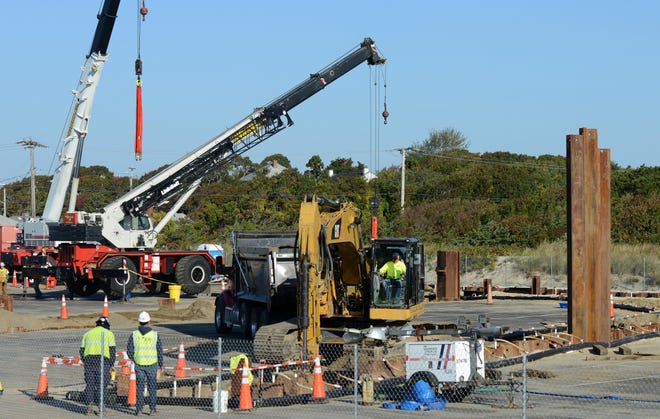
Work was put on hold during the summer, which is the town's busy beachgoing season. The project resumed in mid-September with staging and construction work within the Covell's Beach parking lot. Parking is limited as a result, but a portion of the lot will remain open to the public throughout the project, which will continue into the spring.
At Covell's Beach, the two major submarine cables will be split into six transmission lines, which will be run under public roadways following a carefully selected route that avoids sensitive habitats.
"The cables will run for about 10 miles from the beach to the substation," said Doba.
Digging under town roads to install duct banks for the transmission lines has started as well. Duct banks, comprised of conduits encased in reinforced concrete, provide protected pathways for the buried cables.
Town saving $4M on sewage pipe installation
In tandem with the duct bank work, Barnstable is installing sewer lines, which is saving the town close to $4 million, Doba said. Vineyard Wind is footing the bill to place the sewer lines along with the transmission cables, as well as to repave the roads, curb to curb.
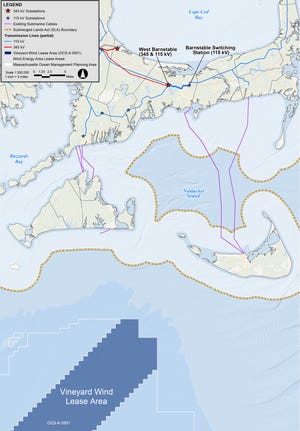
In Hyannis, work is also ongoing on the on-shore substation which will receive the transmission cables and distribute power from there, Doba said.
"That's made a ton of progress," he said.
Vineyard Wind expects to begin generating power by the end of next year, with a projected total completion of the project in 2024.
More:Blowing away the competition
Eventually, 62 wind turbines will also be erected out beyond the Vineyard, each spaced one nautical mile apart. Originally, Vineyard Wind considered building 84 turbines, but during the three-year permitting process technology advanced, allowing the switch to fewer turbines, Doba said.
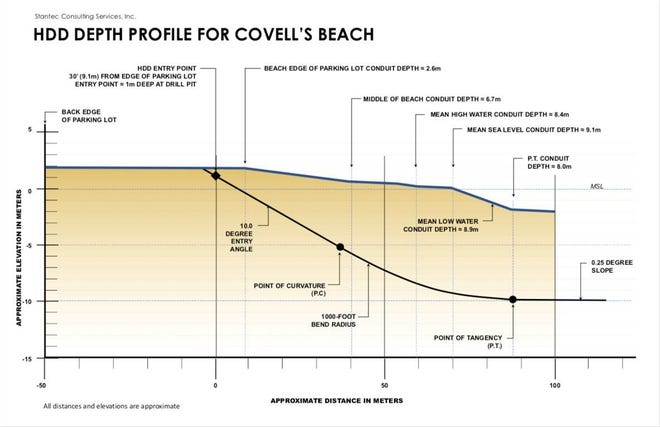
Plans now call for using General Electric Haliade-X turbines, which can each generate 13 megawatts of electricity. When it's fully operational, Vineyard Wind it will generate 800 megawatts each year, according to Doba. This will power more than 400,000 homes, an equivalent of removing 325,000 vehicles from roadways.
Components of the turbines should arrive in New Bedford for assembly sometime next year, Doba said.
New Bedford's role in project
Roy said New Bedford is a key player in getting the pieces put together. Each turbine, he said, weighs 50 tons. Since a typical port can't handle that kind of weight, a new port is planned.
"Right now it's an empty lot and it's huge," Roy said. "But once they get this thing up and running, and you see some of the activity, it will be incredible."
The process will include building the turbine towers, which come in sections, and attaching the enormous blades.
"Then they have to transport them out to the site," Roy said.
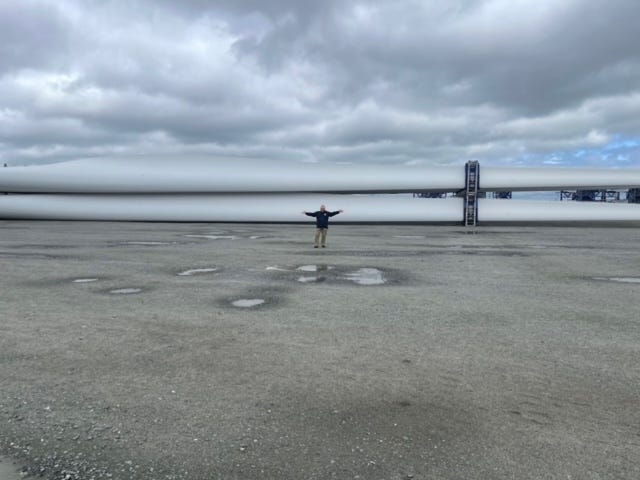
He already has an idea of what it all will look like, having traveled to Denmark earlier this year with the Alliance for Business Leadership to view the Middlegrunden Offshore Wind Farm in the Oresund between Denmark and Sweden, as well as to visit the Port of Esbjerg — a leading port in Europe for handling and shipping out wind-generated electricity.
"Esberg gave me a glimpse of what we can expect," Roy said, noting Denmark is a world leader in the off-shore wind industry.
Massachusetts, he said, is set to be like the "Saudi Arabia of wind power" in the United States. Besides Vineyard Wind, which is the trailblazer, other companies are pursuing projects south of the Vineyard.
"There are seven lease areas out there," Roy said. "Right now we've got Vineyard Wind. Mayflower Wind is coming in right after them, and then we have a third company that's bid came in. That would be Avangrid."
New York is dipping its toe in the off-shore wind industry as well. The state recently held an auction for lease areas off its shores, Roy said.
"You're going to see lease areas all up and down the East Coast, all the way up to the Gulf of St. Lawrence and down to the Carolinas," he said.
National goal for wind power
President Biden has set a goal of generating 30 gigawatts of wind power by 2030.
"The lease areas of Massachusetts have a capacity of 11 gigawatts," Roy noted. "So we alone have over a third of the national goal. It's simply amazing."
He said waters south of the Vineyard are shallow, which can accommodate fixed towers into the ocean floor.
"It's also the most robust wind in the entire contiguous United States, so it's a perfect conflation of location and wind speed," Roy said.
And that's why in his role as a chairman of the state committee charged with looking at energy and utilities he has been pushing to take advantage of "this incredible capacity that we have."
"The potential is enormous. It's a robust source of clean energy, a robust source of new jobs, and it's clean and green," he said. "I am truly excited by what I see."

No comments:
Post a Comment
Note: Only a member of this blog may post a comment.